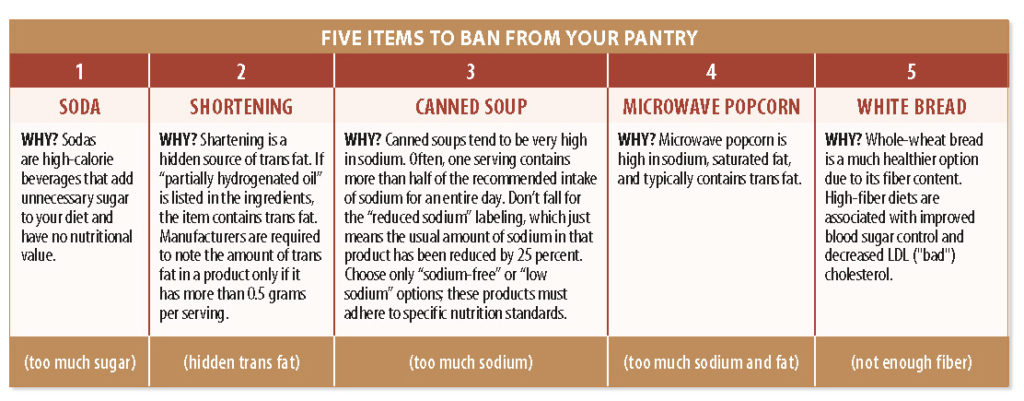The Healthiest Foods to Keep in Your Kitchen
Stocking your fridge and pantry can make meal preparation healthier and easier, but many packaged products aren’t worth the shelf space from a nutrition standpoint. Canned goods in particular may make for easy meal planning, but they tend to be full of sodium and other unhealthy ingredients. Registered dietitian Susan Bowerman, MS, RD, from UCLA Health System offers her advice on some of the best food options to always keep on hand.
“Colorful fruits and vegetables are great,” Bowerman says. “Berries, citrus fruits, car-rots, broccoli, leafy greens, and tomatoes are especially good to always have on hand.”
If you’re looking for foods that don’t spoil, Bowerman recommends that you stock up on tree nuts and tree nut butters.
Tuna is an excellent source of protein and heart-healthy omega-3 fatty acids. The American Heart Association recommends at least two servings of fish per week to protect against heart disease. If you’re purchasing canned or packaged tuna, be sure that it is stored in water and not oil, and look for the low-sodium option, if available.
Foods with a longer shelf life. When fruits or vegetables are not in season, try buying the frozen variety. “Frozen fruits like berries and mango and frozen vegetables like spinach and broccoli are always good to keep in your freezer,” says Bowerman. Dried fruits and vegetables are also good to keep on hand.
Lentils are protein-rich, easy to cook, and can be incorporated into a variety of main dishes, soups, and salads. Quinoa is a whole grain that is rich in protein, quick and easy to make, tastes great hot or cold, and is a great substitute for pasta or rice. Barley is an excellent source of fiber; it helps lower cholesterol and requires little work to prepare. Just add fresh or dried herbs and olive oil to cooked barley for a delicious, healthy side dish.
What to avoid. A lot of common pantry foods tend to be high in sodium, so pay attention to the label. Statistics show that ninety-seven percent of Americans consume too much salt, and too much sodium in the diet can raise blood pressure and increase the risk of stroke and kidney disease.
Processed foods tend to be high in sodium because sodium is a preservative as well as a flavor agent; it helps extend the shelf life of cookies, snack cakes, crackers, and many other bagged and boxed foods.
Pantry foods also often contain trans fat. Another way to extend the shelf life of products is through a process called hydrogenation, which creates trans fat.
Research has shown that this type of fat has serious health implications, including a greater risk of heart disease and diabetes. In addition, these foods tend to be lower in fiber and higher in sugar.

The post The Healthiest Foods to Keep in Your Kitchen appeared first on University Health News.
Read Original Article: The Healthiest Foods to Keep in Your Kitchen »
Powered by WPeMatico


